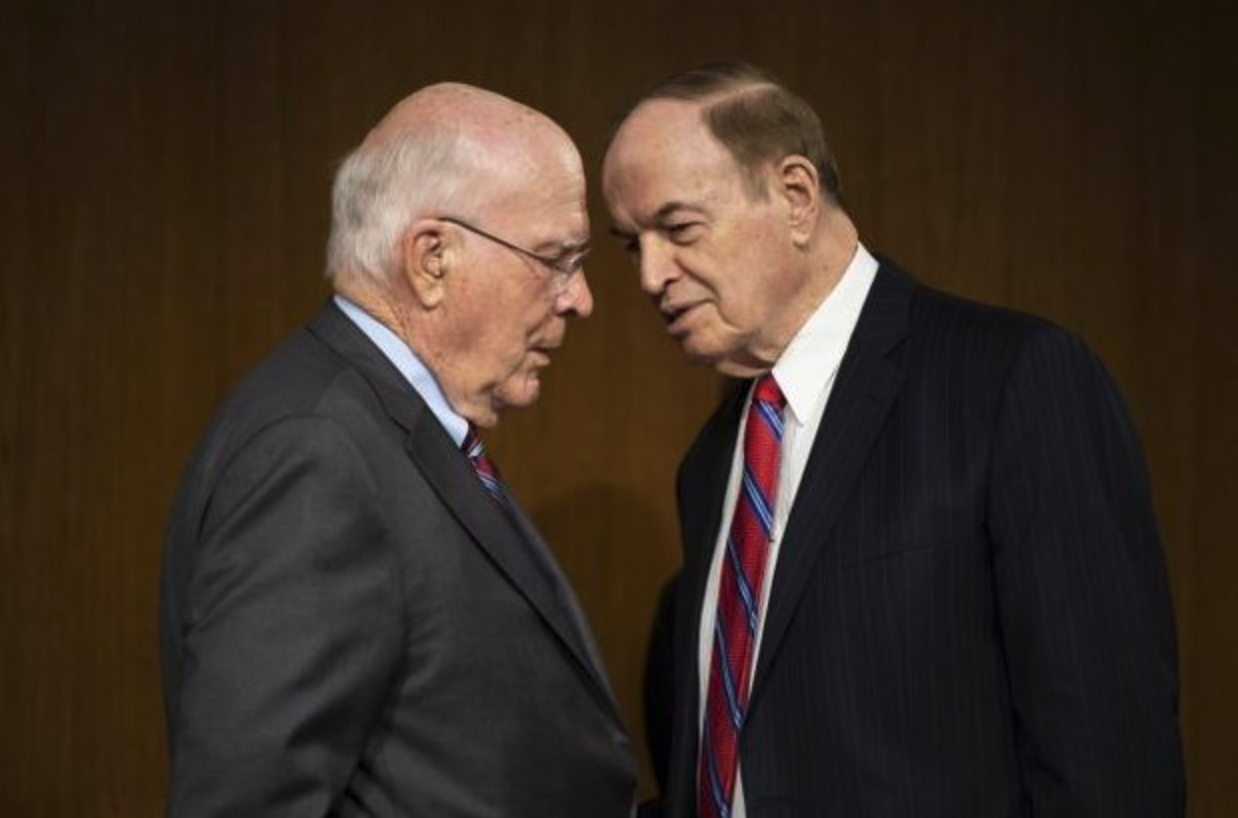
Senate Appropriations Chair Patrick Leahy (D-Vt.) and ranking member Richard Shelby (R-Ala.): NAJ screen shot
ANALYSIS –
By Glynn Wilson –
WASHINGTON, D.C. — Funding the government of the United States used to be a fairly routine affair, and for most of its history, Congress went home in recess before Thanksgiving and members didn’t come back to Washington until the new year.
Not anymore.
For the past 40 years or so, members of the Republican Party have periodically used a threat of a government shutdown to hold the budget process hostage, often meaning members had to remain in the nation’s capital to vote on a budget and other matters right up until Christmas Eve.
It all started under Republican President Ronald Reagan, who ran a campaign like a crusade to “reduce the size of government.”
In November, 1981, Reagan wanted billions in domestic spending cuts and promised to veto any bill that didn’t include them. Congress fell short of his goal, so he vetoed the bill and ordered a shutdown. It lasted two days, until Congress passed a short-term funding deal to allow time to negotiate a longer-term solution.
That’s when the federal budget became a political football.
The government was shutdown for lack of a budget for four days in 1982, three days in 1983, three days in 1984, one day in 1986, one day in 1987 and three days in 1990.
The political games got worse in 1995, when the Republicans took over as a majority in Congress after Democrat Bill Clinton had been elected president in 1992. Newt Gingrich was elected Speaker of the House, and he ramped up the war on federal government spending, turning the budget into a partisan tool.

Republican presidential candidate Newt Gingrich at the Alabama Theater in Birmingham, March 2012: Glynn Wilson
The government was shut down for five days in November, 1995, after Clinton vetoed legislation that would have raised Medicare premiums and required him to submit a seven-year balanced-budget plan. Ultimately Clinton and Republicans agreed to a temporary measure to fund the government and to produce a seven-year balanced budget.
But that was not good enough for Gingrich. The government shutdown again for 21 days in December, 1995, and January, 1996, when Clinton and the Republicans disagreed on how to balance the budget within seven years. Clinton used the more optimistic Office of Management and Budget projections, and Republicans insisted on using Congressional Budget Office estimates. Senate Republicans gave in to pressure to reopen the government, and the party temporarily abandoned their goal of enacting a seven-year balanced budget plan.
Budget peace was reached after that, and held for 17 years, until President Barack Obama pushed through the Affordable Care Act in Congress and then Republicans took over as a majority in Congress again in 2010. The government was shut down for 16 days in 2013, when hard-line conservatives pushed Republican leaders to use a shutdown threat to block parts of “Obamacare.” Eventually Republicans relented by overwhelmingly passing a bill to fund the government without any major health-care provisions.
The problem was solved for awhile, until January, 2018, when Democrats wanted protections for “dreamers,” immigrants brought to the United States illegally as children. Republicans refused to negotiate on immigration until government funding was passed. Senate Democrats bowed to pressure to reopen the government when Republicans committed to hold a vote resolving the status of “dreamers” by mid-February.
Technically the government was shutdown for lack of funding for a half-day in February, 2018, when Senator Rand Paul, a Republican, briefly filibustered a two-year bipartisan spending bill over its cost. Democrats wanted a solution for “dreamers.” After the time for debate expired, Congress voted overnight to increase domestic and military spending caps and to fund the government. No deal was made for “dreamers.”
After Trump was surprisingly elected president in 2017, and inaugurated in January, 2018, he began fighting for funding for a border wall on the U.S.-Mexico border as he had promised during his campaign, to “build a wall.” But the Democrats won a controlling majority in the House in 2018, so a fight ensued.
The federal government was shutdown for 34 days in 2018-2019. Trump wanted funding for the border wall, but Democrats, who took control of the House during the shutdown, wanted to fund the government temporarily with no strings attached. Congress passed a three-week continuing resolution to reopen the government while debate on a border wall continued.
Related: WP: Longer government shutdowns have become more common
Congressional Research Service
Republican Senator Richard Shelby of Alabama, along with his colleague Senator Patrick Leahy of Vermont, a Democrat, have been involved in many of these fights over the years, leading to compromises from their ranking positions on the Senate Appropriations Committee. Both are retiring this year, so who knows who will lead this charge in the future.
This week, as members of the lame duck Congress remain in town trying to negotiate a last minute budget deal, a $1.7 trillion deal to fund government to avert another government shutdown was put forward. If no deal is reached on an “omnibus” spending bill by Friday, Dec. 23, the day before Christmas Eve, the government could face another government shutdown this year.
According to The Washington Post, a 4,155-page omnibus measure is on the table, which includes funding for key elements of President Biden’s economic agenda, and an increase in defense spending, including $44.9 billion in emergency military and economic assistance for Ukraine still fighting a war with Russia.
Democrats did not achieve all of the increases to domestic spending that they initially had sought, according to this reporting, which included some concessions in talks with Republicans who are set to assume control of the House in January. But the two party leaders did agree to stitch onto the measure a wide array of long-simmering and stalled bills, recognizing the omnibus marks their final major legislative opening before Congress resets in the new year.
Some measures to improve pandemic readiness were included, along with an extension to some Medicaid benefits, help for Americans to save for retirement, a ban on the use of TikTok on government devices and to change the way the country counts presidential electoral votes. The bipartisan election bill — known as the Electoral Count Act — is included, which seeks to respond to the Jan. 6, 2021, attack on the Capitol.
“But Democrats and Republicans could not find compromises on other outstanding fiscal and economic debates,” the Post reports, “particularly around a package of tax credits that might have aided low-income families with children while preserving tax breaks for businesses — a slew of thorny issues that now await lawmakers in a tougher political environment next year.”
It’s now a race against the clock. Congress has until the end of the day Friday to approve the package or else federal funds are set to run out, bringing key agencies and programs to a halt.
“To prevent a catastrophic shutdown, the two warring parties must band together, particularly in the narrowly divided Senate, where Democrats need at least 10 Republican votes to proceed swiftly and pass the spending bill.”
“Despite having a little more work to do, the omnibus continues heading in the right direction,” Senate Majority Leader Charles E. Schumer (D-N.Y.) said Monday on the chamber floor as the bill was being finalized, adding lawmakers were “working hard to get it done before the end of the week.”
Some Republicans are not going along with the deal, arguing that the talks should have been postponed until January, when the party assumes control of the House. California Republican Kevin McCarthy, the leading candidate to become Speaker of the House next year, blasted his counterparts in the Senate for engaging Democrats at all.
“Republicans are about to literally give the Biden administration a blank check,” said Rep. Chip Roy (R-Tex.), a member of the conservative House Freedom Caucus, during an appearance on “Fox News Sunday.”
“Republican leadership in the Senate — and frankly, too many in the House — are walking away from using that important tool to check the executive branch,” he added.
McCarthy’s allies in the Senate, meanwhile, have raised the prospect that they could try to slow down debate even as the shutdown deadline draws near.
“I don’t know why any Republican, let alone 10, would want to help them do that in those circumstances,” said Republican Senator Mike Lee of Utah at a news conference last week, declining to say whether he would raise “procedural objections” to a vote.
Partisan disputes spoiled other discussions, including a last-minute push to secure a deal on taxes. Democrats had hoped to expand the child tax credit, after an earlier policy — providing monthly payments to low-income families in need — expired last year. Republicans, meanwhile, aimed to preserve tax breaks for businesses that the party first secured under its 2017 overhaul. Ultimately, though, the two sides could not find common ground on a compromise, foreshadowing the tough fights to come in a divided Congress next year.
To assuage Republicans, who insisted on robust defense spending, the omnibus included nearly $798 billion for the Pentagon and related programs. Taking to the floor Monday before lawmakers released the legislation, Senate Minority Leader Mitch McConnell (R-Ky.) touted that funding as he sought to sell the deal to his party: He heralded its inclusion of a “substantial, real-dollar increase” for defense — while pointing to what he called a “substantial real-dollar cut” to Biden’s other spending priorities.
Shelby, in a statement earlier Tuesday, added the “far from perfect” negotiations had “allowed Republican redlines to be adhered to,” and he similarly urged his colleagues to back the bill.
“We need to do our job and fund the government,” he said in a statement.
The omnibus also proposed nearly $773 billion for domestic programs, a 10 percent increase, which included a significant increase in federal funding for veterans and new money meant to improve child-care programs, combat substance abuse and help needy families access food.
“The pain of inflation on American families is real, and it is being felt right now across the federal government,” Leahy said in a statement, adding the bill “directly invests in providing relief from the burden of inflation on the American people.”
Lawmakers also provided new money for some of Biden’s top accomplishments, including bipartisan laws to boost U.S. infrastructure and to promote the domestic manufacturing of small computer chips, known as semiconductors. And the bill provisioned about $40 billion in emergency funds in response to recent natural disasters, including Hurricane Ian.
“As communities across the country work to rebuild after unprecedented natural disasters, this bill provides the urgently needed support to help families, small businesses, and entire towns and cities get back on their feet and repair damaged infrastructure,” said Connecticut’s Rosa DeLauro, chair of the House Appropriations Committee.
Democrats did not secure all of the spending they were after, however. Maryland Senator Chris Van Hollen, a member of the Appropriations Committee, warned the party would see “painful cuts,” but acknowledged that even that was “a lot better than it would be” if lawmakers had simply extended existing funding levels
The bill’s unveiling was delayed by an argument over language related to location of the FBI’s future headquarters, according to other local reporting.
Related: F.B.I. Headquarters Move Could be a Legacy Project for Greenbelt’s Congressman, Steny Hoyer
Maryland lawmakers have argued that ensuring predominately Black communities get their fair share of federal investments should be more thoroughly considered as part of the selection process. They are advocating for building the headquarters at one of two sites in Maryland’s Prince George’s County, perhaps the best one near the Greenbelt Metro Station.
In September, the General Services Administration issued a site selection plan based on five criteria, the most heavily weighted at 35 percent was proximity to the FBI training academy in Quantico, Virginia. Advancing equity was weighted at 15 percent.
Van Hollen said at a recent forum that a Biden executive order early in his administration emphasized that the issue of racial equity is not just an issue for any one department, but it has to be the business of the whole government.
“I would submit that the GSA and the FBI clearly haven’t gotten the message, given the low weight they’ve given to this factor,” Van Hollen said.
A Senate Democratic aide familiar with the negotiations said Schumer worked to incorporate language in the spending bill ensuring the GSA administrator conduct “separate and detailed consultations” with lawmakers representing the Maryland and Virginia sites to get their perspectives before making a final decision on selection of the site.
Republicans refused to relent in their opposition to delivering new money to respond to the coronavirus pandemic, which they have blamed for a rise in inflation. The White House had asked for $22.4 billion, largely to purchase and facilitate the next generation of vaccines, yet Republican lawmakers refused to budge even as top administration officials warned about the risks of poor preparation.
The must-pass spending bill still offered an opening for lawmakers to advance a slew of other proposals, some of which target Medicaid, which provides health insurance to low-income Americans. In a win for Republicans, the package allows states to start reevaluating who is still eligible for the program beginning in April.
It also includes some long-sought Democratic priorities, such as allowing states to permanently extend Medicaid coverage for new mothers for 12 months and barring children from getting kicked off their Medicaid or Children’s Health Insurance Program coverage for a continuous 12 months, even if a family’s income fluctuates.
According to reporting from Bloomberg News, the proposed measure would boost federal discretionary spending, keep restrictions on funding for abortions, and trim Internal Revenue Service funds.
Other Provisions
Electoral College: The legislation would change the way electoral votes are counted for presidential elections, clarifying that the vice president does not have the ability to toss out Electoral College votes.
TikTok: Lawmakers included a ban federal employees from using Chinese app TikTok on government-owned devices in the bill.
Children’s Nutrition: Legislation giving extra food aid to families with kids when they’re out of school in the summer made it onto the spending package.
Interior, EPA: Appropriators included about $40 billion in fiscal 2023 for the Interior Department, Environmental Protection Agency, and related agencies in the omnibus.
Clean Energy: The package would allocate $3.5 billion for energy efficiency and renewable energy, and $7 billion for defense environmental cleanup activities.
Debt Ceiling: Lawmakers are forgoing the opportunity to attach an increase to the nation’s $31 trillion debt ceiling to the bill, setting up a fight next year with House Republicans.
Marijuana Banking: Legislation to open banking services to marijuana businesses was left out of the funding package.
R&D Tax: A slate of expired and expiring tax provisions are not included in a spending package.
___
If you support truth in reporting with no paywall, and fearless writing with no popup ads or sponsored content, consider making a contribution today with GoFundMe or Patreon or PayPal.
Before you continue, I’d like to ask if you could support our independent journalism as we head into one of the most critical news periods of our time in 2024.
The New American Journal is deeply dedicated to uncovering the escalating threats to our democracy and holding those in power accountable. With a turbulent presidential race and the possibility of an even more extreme Trump presidency on the horizon, the need for independent, credible journalism that emphasizes the importance of the upcoming election for our nation and planet has never been greater.
However, a small group of billionaire owners control a significant portion of the information that reaches the public. We are different. We don’t have a billionaire owner or shareholders. Our journalism is created to serve the public interest, not to generate profit. Unlike much of the U.S. media, which often falls into the trap of false equivalence in the name of neutrality, we strive to highlight the lies of powerful individuals and institutions, showing how misinformation and demagoguery can harm democracy.
Our journalists provide context, investigate, and bring to light the critical stories of our time, from election integrity threats to the worsening climate crisis and complex international conflicts. As a news organization with a strong voice, we offer a unique, outsider perspective that is often missing in American media.
Thanks to our unique reader-supported model, you can access the New American journal without encountering a paywall. This is possible because of readers like you. Your support keeps us independent, free from external influences, and accessible to everyone, regardless of their ability to pay for news.
Please help if you can.
American journalists need your help more than ever as forces amass against the free press and democracy itself. We must not let the crypto-fascists and the AI bots take over.
See the latest GoFundMe campaign here or click on this image.
Don't forget to listen to the new song and video.
Just because we are not featured on cable TV news talk shows, or TikTok videos, does not mean we are not getting out there in search engines and social media sites. We consistently get over a million hits a month.
Click to Advertise Here















